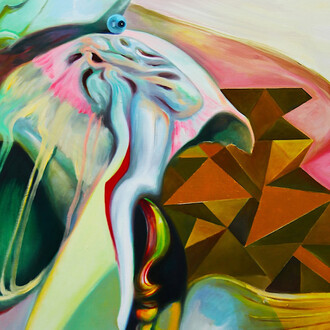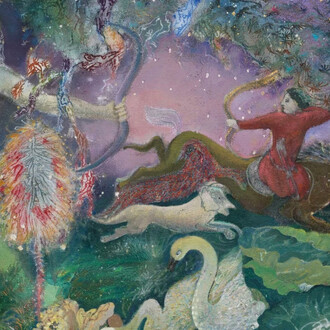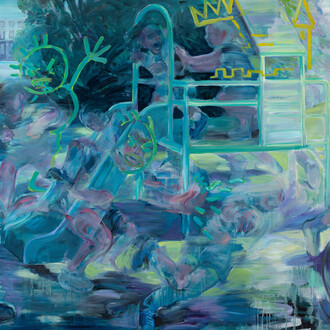White Columns is pleased to present 8, the debut solo exhibition by the New York-based artist Francesse Dolbrice (b. 1995, Port-au-Prince, Haiti.) Embracing ceramics, sculpture, drawing and textiles, Dolbrice’s work, when seen in its totality, is a multidisciplinary investigation of the systems — biological, psychological, neurological, philosophical, etc. — through which the artist comprehends their interactions with the surrounding world. About their work, Dolbrice has said: “As a cartographer maps out an atlas, I map out the neurodivergence and subtle ingestions that my brain experiences during different emotional moments, and cognition. Making sure to note both the similarities and the differences of the ‘terrain’, the ‘bodies of water’, the ‘atmosphere’, and the ‘ecosystem’ of every region”.
Throughout Dolbrice’s exhibition, fragile materials — e.g. paper, ceramic — interact with sturdier forms of shaped and carved wood. Though delicate, the forms are suggestive of more solid things to come, operating like sketches, models or blueprints. In one sculpture, a shaped piece of paper wraps over, around and under a wooden frame, effectively containing the form we might have expected to contain it. Other shaped paper structures extend like cornices from the wall behind, as if supporting the frame, which hovers suspended just out of their reach. In another wall-based work a folded paper shape extends from the bottom of a drawing. The sparse lines of the drawing suggest three-dimensionality, and are interrupted by a fuzzy pastel arch, like a shimmering portal to another realm. The suggestion of something beyond that which meets the eye recurs in the structure underneath the drawing, which has the appearance of a box with flaps folded inward, so that the interior of the shape is partially obscured: revealed and hidden in the same gesture.
Throughout their practice, Dolbrice manages to both explicate and obfuscate questions of legibility and meaning-making. Though the forms and figures that comprise 8 stem from actual sensorial experiences seen and felt by the artist, a direct explanation of this private meaning is invariably withheld from the viewer, so that a visitor to the gallery will essentially encounter each piece on its own terms. Dolbrice hopes that the work done by the viewer in reacting to the exhibition will serve as, in their words, “a form of leveling labor, as well as a way to form connectivity with specific audiences.” Seeing the work for the first time, one has the sense of encountering the distillation of a vast, dense system of meaning that can be grasped only in parts. In this sense, the physical forms that emerge from Dolbrice’s personal cosmology function like ciphers, formed in translation: a language system created by the artist that gains an additional layer of meaning via the viewer’s interpretation of it.
The fluidity and openness afforded by abstraction also appeals to the artist as a means of safeguarding parts of their personal identity. They are wary of the figurative and even of representation itself, keenly aware that presenting anything approaching a literal “self portrait” inherently risks that image being co-opted or exploited. Abstraction, then, provides a site for investigation into the self cloaked in a certain intentional opacity. Constrained by an almost hermetic set of symbols and formulations meant to express an interior geology, Dolbrice has constructed and choreographed an exploration of selfhood that is made all the more vivid by its strangeness.
Francesse Dolbrice is a multidisciplinary Sculptor and Drafter, whose work analyzes ideas of perception, existence, and identity through interwoven methodologies. Entranced by the tension that arises when one faces the question of “what is reality?” and the complexities that put the validity of this question in flux. They are compelled to depict thoughtful layers of archival research through orchestration. Francesse uses their practice as a form of grounding and connection, tuning their own specificities in an approach for clarity. A Haitian both in theoretical traditions and ethnicity, they are developing a practice that is aligned with bodily knowledge and terrestrial positioning.
This exhibition is accompanied by a new text by the artist, copies of which are available at the gallery.
















